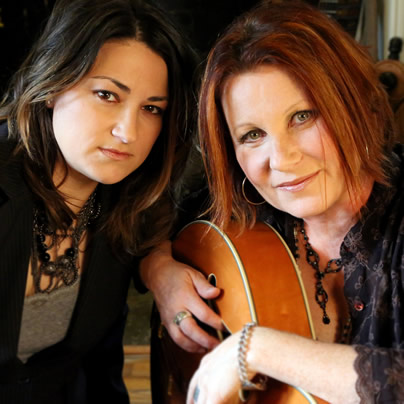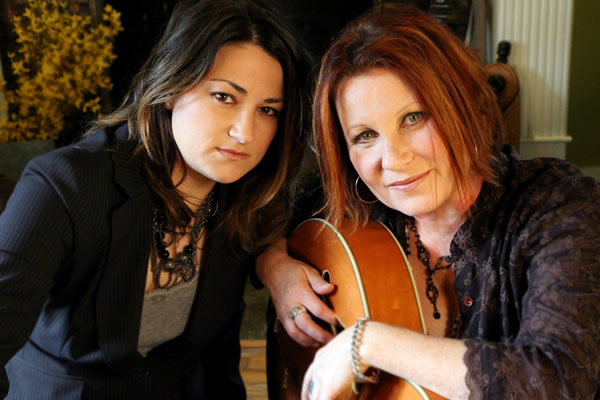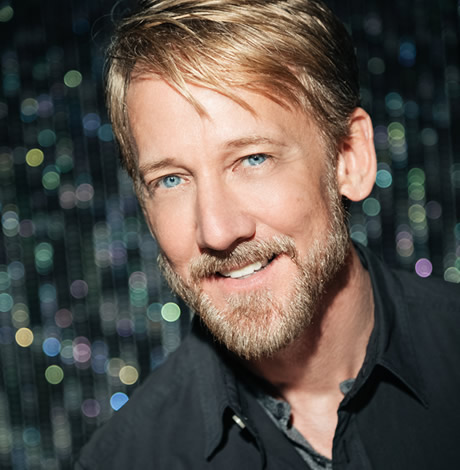Arts & Entertainment
Sisters in spirit
Gospel music vets Knapp, Becker unite for Christmas album, tour

Margaret Becker and Jennifer Knapp
‘The Hymns of Christmas Tour’
Monday, 7:30 p.m.
The Birchmere
3701 Mount Vernon Ave.
Alexandria, VA
$25

Margaret Becker (right) a veteran of gospel music with classic albums like ‘Immigrant’s Daughter’ and ‘Simple House’ in her canon, just finished a Christmas album with Jennifer Knapp, a gospel artist who emerged in the late ’90s. (Photo by Heidi Groff; courtesy Jay Jones Music)
Any touring musician will tell you life on the road — even when you can afford first class all the way — can get to you after years of going through the endless recording/promoting/touring/repeat cycle.
Two gospel music veterans who, at different times and to varying degrees, each spent years out of the limelight, are back with a wildly unexpected joint project — an album called “The Hymns of Christmas.” On it, Margaret Becker and Jennifer Knapp trade leads and harmonies and enjoy what they say is great musical repartee. They’re half-way through a 14-date mini-tour to support it and play the Birchmere in Alexandria, Va., Monday night.
Knapp, 38, released her first major label album to the Christian market in 1998 and worked solidly touring and recording through 2002 at which time she went on a long hiatus, moved to Australia and pretty much gave up any thoughts of continuing her career. She came out as a lesbian in April 2010 and released a comeback album called “Letting Go.” She maintains her Christian faith but says, though she doesn’t claim to be a theologian, she believes many of the scriptures traditionally used to condemn gays have been misunderstood and misinterpreted.
Becker, 53, was practically peerless among Christian music women rockers in her heyday. She released her first album in 1987 and though she recorded plenty of ballads and exhibited tremendous songwriting prowess, Becker always rocked harder than her contemporaries like Amy Grant or Twila Paris. Becker enjoyed a great run throughout the late ‘80s and ‘90s but slowed down tremendously by the ‘00s. Her new effort with Knapp is her first new album since 2007’s “Air.”
During a lunch break last week between back-to-back shows in Canton, Ohio and Indianapolis, Knapp fields a bevy of questions on how she has settled into being an openly gay singer, the collaboration with Becker and how it came about and what fans can expect from their show next week at the Birchmere.
It’s a highly non-glam tour and Knapp makes no attempt to hide it. They’re sharing a van and Becker is in line getting lunch at a Subway while Knapp answers Blade questions. Though the interview is with Knapp, Becker quickly follows up with e-mail inquiries later in the day.
“It’s just gonna be Margaret and I with a couple of acoustic guitars, but don’t let that fool you,” Knapp says. “It’s one of the most fun times I’ve ever had and it’s not gonna be some pared down girly acoustic thing. It’s gonna be a really good, full-voiced night. It shocks me when I look over at her and see how much she gives each night.”
Though not as active as she formerly was, Becker still speaks at religious women’s events and participates in hymn recording projects. Her audience is very much part of the Nashville-based contemporary Christian industry, the ranks of which both she and Knapp came through.
The two met in about 2000 when they both participated in a pair of multiple-artist projects and became friends. Knapp, who long has admired Becker, says it took no arm-twisting to convince Becker to record and tour with her, though many gospel fans turned their back on Knapp.
“Fortunately it’s not really an issue we’ve had,” Knapp says. “Tonight’s going to be a prime example. We’re playing at a United Methodist church in Indianapolis. It will be a lovely Christmas evening and the last thing we’ll be talking about is our sexual orientation. It’s a huge step for that church to host somebody like me and just proceed as if it’s business as usual but I think we’re seeing that more and more in terms of the public consciousness. I think we saw that in this last election. It’s great that people can take that and not draw this unusual amount of attention to it. That’s really the extraordinary part of it.”
Becker, in an e-mail exchange, says she’s not finding fans and those coming to the shows to be inferring anything about her life or ministry by her collaboration with Knapp.
“The audiences who are supporting this are music lovers who recognize when the work is symbiotic and complementary,” Becker says. “We’ve played this tour to those people, groups that I consider to be overlapping supporters from both of our bases. They are respectful and come for the music and spirit or the art of the material. I don’t think they give it much more thought than that and to me, that’s perfect. That’s how it should be.”
For the record, Becker declines to comment on her own sexual orientation. “My personal life is private and I’m very happy,” she wrote in an e-mail via her publicist. “I am very supportive of Jennifer and this musical partnership we’ve created and look forward to sharing it with her supporters and mine.”
The album features mostly acoustic arrangements of traditional church classes like “Hark the Herald Angels Sing,” “The First Noel,” “What Child is This,” “Silent Night” and more. Neither artist had recorded a Christmas album before and now that both are again living in the Nashville area, they decided this summer to go ahead and make it happen.
“We finally said, ‘Let’s just do it, let’s just get it done,’” Knapp says. “There was no pressure to write anything new, they’re all hymns so there’s a great wealth of material there and lots of opportunities for us to harmonize. We just decided to put our money where our mouth was and go ahead and do it.”
Becker concurs.
“One night we just got serious and realized we’d both put off making a Christmas record over the course of our careers, at least the kind that was indigenous to us. That’s where the idea came from. Making music with a dear friend who is also an awesome talent was the catalyst for me. It was fun top to bottom.”
The indie album was recorded on a shoestring with, Knapp says, basically “one mic and one computer.” She says the advance of user-friendly recording software made it possible to do the album without spending thousands. They did some spring rehearsing, hit the studio in July (when most Christmas albums are recorded) and did most of the work in a four-week span. The mixing and packaging came soon after and the project wrapped in October.
“It did feel a little weird at first singing all these Christmas songs while you’re just dripping in sweat in the middle of the hot Tennessee summer,” she says. “So at the beginning, yeah, it took a little time to wrap my head around a Christmas project but pretty quickly it really did start to feel like its own project. It didn’t feel kitschy or Christmasy really to me. We approached it in a very honest sense and didn’t want to make it kitschy. Maybe it’s just because I was involved with it but I really was thinking, ‘Wow, I could listen to this any time of the year.’”
The first half of the show is basically the new album. In the second half, the two revisit their hits, trade harmonies on each other’s songs and keep it loose enough that the set list varies from show to show.
“We’ve sort of got this telepathy thing going on for the last two or three shows,” Knapp says. “We’ll just kind of riff on a theme for a bit and it’s great knowing you don’t have to play it exactly the same way every night or carry the full weight of the evening by yourself.”
Knapp ends the conversation weighing in on a blaze of topics. On whether or not Christians in the U.S. are becoming less rigid on homosexuality, Knapp says there “will always be people who aren’t going to change their minds no matter what.” She says she finds encouragement in the Mainline Protestant denominations that are making gay-friendly strides more and more as time progresses.
Why then, one wonders, have those kinds of churches not spawned their own cottage industry of gospel music the way the evangelical/Bible Belt world did starting with “Jesus music” in the late ‘60s?
“It’s a question I’ve been asking myself for years,” Knapp says. “There are thousands of singers who write about their faith from very different viewpoints but I really think a lot of it has to do with the circumstances in that world where the people who run the industry really see themselves as the gatekeepers and a great emphasis is placed on how the individual artist acts and who they hang out with and how you think about your faith. We’ve seen a lot of strong artists pulled from shelves because they’ve gotten divorced or had an alcohol problem or whatever. As a songwriter you really have to keep writing true and honest stories. If you’re only writing music for Christians, by Christians to make more Christians, you kind of lose out.”
Lee Tucker, a long-time gay gospel music fan and Alexandria, Va., resident, says Knapp deserves enormous credit for being brave enough to come out, despite what it might cost her in lost airplay, space at Christian retail and fans.
“I think it’s amazing she took the brave jump to come out,” Tucker says. “It was a big jump for Chely Wright too because a lot of country music is in the Midwest and in the Bible Belt, but it’s even more of a leap for Jennifer because it will totally change her market. If you went into a Christian bookstore right now, you wouldn’t find any of her stuff on the shelves at all.”
For LGBT teens who might be coming up in evangelical households, Knapp says hang in there and remember there are faith-based Christian groups out there that affirm gays.
“Absolutely get online, there are so many people out there waiting with open arms,” she says. “The Christian Network, Believe Out Loud, Soulforce, Inside Out Faith — there are a lot of people out there offering very compassionate, faith-based support. It’s not longer just churches being the bad guys here. A lot of them are starting to get the message.”

Friday, Feb. 20
Center Aging Monthly Luncheon with Yoga will be at noon at the D.C. LGBTQ+ Community Center. Email Mac at [email protected] if you require ASL interpreter assistance, have any dietary restrictions, or questions about this event.
Trans and Genderqueer Game Night will be at 7 p.m. at the D.C. Center. This will be a relaxing, laid-back evening of games and fun. All are welcome! We’ll have card and board games on hand. Feel free to bring your own games to share. For more details, visit the Center’s website.
Go Gay DC will host “First Friday LGBTQ+ Community Social” at 7 p.m. at Hotel Zena. This is a chance to relax, make new friends, and enjoy happy hour specials at this classic retro venue. Attendance is free and more details are available on Eventbrite.
Saturday, Feb. 21
Go Gay DC will host “LGBTQ+ Community Brunch” at 11 a.m. at Freddie’s Beach Bar & Restaurant. This fun weekly event brings the DMV area LGBTQ community, including allies, together for delicious food and conversation. Attendance is free and more details are available on Eventbrite.
LGBTQ People of Color will be at 7 p.m. on Zoom. This peer support group is an outlet for LGBTQ People of Color to come together and talk about anything affecting them in a space that strives to be safe and judgement free. There are all sorts of activities like watching movies, poetry events, storytelling, and just hanging out with others. For more information and events, visit thedccenter.org/poc or facebook.com/centerpoc.
Sunday, Feb. 22
Queer Talk DC will host “The Black Gay Flea Market” at 1 p.m. at Doubles in Petworth. There will be more than 15 Black queer vendors from all over the DMV in one spot. The event’s organizers have reserved the large back patio for all vendors, and the speak easy for bar service, which will be serving curated cocktails made just for the event (cash bar.) DJ Fay and DJ Jam 2x will be spinning the entire event. For more details, visit Eventbrite.
Monday, Feb. 23
“Center Aging: Monday Coffee Klatch” will be at 10 a.m. on Zoom. This is a social hour for older LGBTQ adults. Guests are encouraged to bring a beverage of choice. For more information, contact Adam at [email protected].
Tuesday, Feb. 24
Coming Out Discussion Group will be at 7 p.m. on Zoom. This is a safe space to share experiences about coming out and discuss topics as it relates to doing so — by sharing struggles and victories the group allows those newly coming out and who have been out for a while to learn from others. For more details, visit the group’s Facebook.
Genderqueer DC will be at 7 p.m. on Zoom. This is a support group for people who identify outside of the gender binary, whether you’re bigender, agender, genderfluid, or just know that you’re not 100 percent cis. For more details, visit genderqueerdc.org or Facebook.
Wednesday, Feb. 25
Job Club will be at 6 p.m. on Zoom upon request. This is a weekly job support program to help job entrants and seekers, including the long-term unemployed, improve self-confidence, motivation, resilience and productivity for effective job searches and networking — allowing participants to move away from being merely “applicants” toward being “candidates.” For more information, email [email protected] or visit thedccenter.org/careers.
Asexual and Aromantic Group will meet at 7 p.m. on Zoom. This is a space where people who are questioning this aspect of their identity or those who identify as asexual and/or aromantic can come together, share stories and experiences, and discuss various topics. For more details, email [email protected].
Thursday, Feb. 26
The DC Center’s Fresh Produce Program will be held all day at the DC Center. To be more fair with who is receiving boxes, the program is moving to a lottery system. People will be informed on Wednesday at 5 p.m. if they are picked to receive a produce box. No proof of residency or income is required. For more information, email [email protected] or call 202-682-2245.
Virtual Yoga Class will be at 7 p.m. on Zoom. This free weekly class is a combination of yoga, breathwork and meditation that allows LGBTQ community members to continue their healing journey with somatic and mindfulness practices. For more details, visit the DC Center’s website.
Sports
US wins Olympic gold medal in women’s hockey
Team captain Hilary Knight proposed to girlfriend on Wednesday

The U.S. women’s hockey team on Thursday won a gold medal at the Milan Cortina Winter Olympics.
Team USA defeated Canada 2-1 in overtime. The game took place a day after Team USA captain Hilary Knight proposed to her girlfriend, Brittany Bowe, an Olympic speed skater.
Cayla Barnes and Alex Carpenter — Knight’s teammates — are also LGBTQ. They are among the more than 40 openly LGBTQ athletes who are competing in the games.
The Olympics will end on Sunday.
Movies
Radical reframing highlights the ‘Wuthering’ highs and lows of a classic
Emerald Fennell’s cinematic vision elicits strong reactions

If you’re a fan of “Wuthering Heights” — Emily Brontë’s oft-filmed 1847 novel about a doomed romance on the Yorkshire moors — it’s a given you’re going to have opinions about any new adaptation that comes along, but in the case of filmmaker Emerald Fennell’s new cinematic vision of this venerable classic, they’re probably going to be strong ones.
It’s nothing new, really. Brontë’s book has elicited controversy since its first publication, when it sparked outrage among Victorian readers over its tragic tale of thwarted lovers locked into an obsessive quest for revenge against each other, and has continued to shock generations of readers with its depictions of emotional cruelty and violent abuse, its dysfunctional relationships, and its grim portrait of a deeply-embedded class structure which perpetuates misery at every level of the social hierarchy.
It’s no wonder, then, that Fennell’s adaptation — a true “fangirl” appreciation project distinguished by the radical sensibilities which the third-time director brings to the mix — has become a flash point for social commentators whose main exposure to the tale has been flavored by decades of watered-down, romanticized “reinventions,” almost all of which omit large portions of the novel to selectively shape what’s left into a period tearjerker about star-crossed love, often distancing themselves from the raw emotional core of the story by adhering to generic tropes of “gothic romance” and rarely doing justice to the complexity of its characters — or, for that matter, its author’s deeper intentions.
Fennell’s version doesn’t exactly break that pattern; she, too, elides much of the novel’s sprawling plot to focus on the twisted entanglement between Catherine Earnshaw (Margot Robbie), daughter of the now-impoverished master of the titular estate (Martin Clunes), and Heathcliff (Jacob Elordi), a lowborn child of unknown background origin that has been “adopted” by her father as a servant in the household. Both subjected to the whims of the elder Earnshaw’s violent temper, they form a bond of mutual support in childhood which evolves, as they come of age, into something more; yet regardless of her feelings for him, Cathy — whose future status and security are at risk — chooses to marry Edgar Linton (Shazad Latif), the financially secure new owner of a neighboring estate. Heathcliff, devastated by her betrayal, leaves for parts unknown, only to return a few years later with a mysteriously-obtained fortune. Imposing himself into Cathy’s comfortable-but-joyless matrimony, he rekindles their now-forbidden passion and they become entwined in a torrid affair — even as he openly courts Linton’s naive ward Isabella (Alison Oliver) and plots to destroy the entire household from within. One might almost say that these two are the poster couple for the phrase “it’s complicated.” and it’s probably needless to say things don’t go well for anybody involved.
While there is more than enough material in “Wuthering Heights” that might easily be labeled as “problematic” in our contemporary judgments — like the fact that it’s a love story between two childhood friends, essentially raised as siblings, which becomes codependent and poisons every other relationship in their lives — the controversy over Fennell’s version has coalesced less around the content than her casting choices. When the project was announced, she drew criticism over the decision to cast Robbie (who also produced the film) opposite the younger Elordi. In the end, the casting works — though the age gap might be mildly distracting for some, both actors deliver superb performances, and the chemistry they exude soon renders it irrelevant.
Another controversy, however, is less easily dispelled. Though we never learn his true ethnic background, Brontë’s original text describes Heathcliff as having the appearance of “a dark-skinned gipsy” with “black fire” in his eyes; the character has typically been played by distinctly “Anglo” men, and consequently, many modern observers have expressed disappointment (and in some cases, full-blown outrage) over Fennel’s choice to use Elordi instead of putting an actor of color for the part, especially given the contemporary filter which she clearly chose for her interpretation for the novel.
In fact, it’s that modernized perspective — a view of history informed by social criticism, economic politics, feminist insight, and a sexual candor that would have shocked the prim Victorian readers of Brontë’s novel — that turns Fennell’s visually striking adaptation into more than just a comfortably romanticized period costume drama. From her very opening scene — a public hanging in the village where the death throes of the dangling body elicit lurid glee from the eagerly-gathered crowd — she makes it oppressively clear that the 18th-century was not a pleasant time to live; the brutality of the era is a primal force in her vision of the story, from the harrowing abuse that forges its lovers’ codependent bond, to the rigidly maintained class structure that compels even those in the higher echelons — especially women — into a kind of slavery to the system, to the inequities that fuel disloyalty among the vulnerable simply to preserve their own tenuous place in the hierarchy. It’s a battle for survival, if not of the fittest then of the most ruthless.
At the same time, she applies a distinctly 21st-century attitude of “sex-positivity” to evoke the appeal of carnality, not just for its own sake but as a taste of freedom; she even uses it to reframe Heathcliff’s cruel torment of Isabella by implying a consensual dom/sub relationship between them, offering a fragment of agency to a character typically relegated to the role of victim. Most crucially, of course, it permits Fennell to openly depict the sexuality of Cathy and Heathcliff as an experience of transgressive joy — albeit a tormented one — made perhaps even more irresistible (for them and for us) by the sense of rebellion that comes along with it.
Finally, while this “Wuthering Heights” may not have been the one to finally allow Heathcliff’s ambiguous racial identity to come to the forefront, Fennell does employ some “color-blind” casting — Latif is mixed-race (white and Pakistani) and Hong Chau, understated but profound in the crucial role of Nelly, Cathy’s longtime “paid companion,” is of Vietnamese descent — to illuminate the added pressures of being an “other” in a world weighted in favor of sameness.
Does all this contemporary hindsight into the fabric of Brontë’s epic novel make for a quintessential “Wuthering Heights?” Even allowing that such a thing were possible, probably not. While it presents a stylishly crafted and thrillingly cinematic take on this complex classic, richly enhanced by a superb and adventurous cast, it’s not likely to satisfy anyone looking for a faithful rendition, nor does it reveal a new angle from which the “romance” at its center looks anything other than toxic — indeed, it almost fetishizes the dysfunction. Even without the thorny debate around Heathcliff’s racial identity, there’s plenty here to prompt purists and revisionists alike to find fault with Fennell’s approach.
Yet for those looking for a new window into to this perennial classic, and who are comfortable with the radical flourish for which Fennell is already known, it’s an engrossing and intellectually stimulating exploration of this iconic story in a way that exchanges comfortable familiarity for unpredictable chaos — and for cinema fans, that’s more than enough reason to give “Wuthering Heights” a chance.
-

 Baltimore5 days ago
Baltimore5 days ago‘Heated Rivalry’ fandom exposes LGBTQ divide in Baltimore
-

 District of Columbia5 days ago
District of Columbia5 days agoDeon Jones speaks about D.C. Department of Corrections bias lawsuit settlement
-

 Real Estate5 days ago
Real Estate5 days agoHome is where the heart is
-

 European Union5 days ago
European Union5 days agoEuropean Parliament resolution backs ‘full recognition of trans women as women’


















